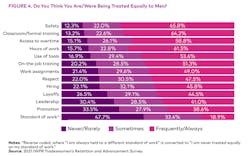Addressing the Construction Industry's Discrimination Issues
The federal government is gearing up an effort to try to root out employment discrimination in the construction industry.
In a newly issued U.S. Equal Employment Opportunity Commission (EEOC) report on advancing equal employment opportunity in the industry, the EEOC lays out elements of a multi-faceted strategy to address what it says is “severe and pervasive discrimination in the construction industry, especially against women and people of color” (Figure).
Tasked with enforcing federal laws prohibiting employment discrimination, the EEOC is pledging to ramp up its education and training outreach to the construction industry while standing firm on investigating and resolving violations. Laying out six distinct action areas in the report, EEOC says the time has come for a more aggressive posture toward the industry.
“The EEOC’s enforcement experience demonstrates that addressing specific violations in isolation as they arise is insufficient to fully address the problem,” the report’s conclusion reads. “Rather, the EEOC must work collaboratively with our partners across the federal government and in the private sector — including unions, contractors, industry liaisons, and community-based organizations — to develop the kind of industry-specific prevention and training that can provide the foundation for lasting change.”
In Building for the Future: Advancing Equal Employment Opportunity in the Construction Industry, EEOC asserts that the industry is rife with discrimination, harassment, and retaliation that has long restricted the entry and thriving of minorities, notably women and Blacks and Hispanics/Latinos. Citing extensive research as well as testimony in a three-hour EEOC hearing on discriminatory barriers in the construction industry held in May 2022, the report paints a picture of an industry that has made scant progress in addressing a culture of discrimination that harms not only workers across the board but the industry itself as it faces a chronic problem of worker shortages.
EEOC doesn’t blanch in its assessment of the industry’s problems, saying it’s been the source of “some of the most egregious incidents of harassment and discrimination” it has investigated. Indeed, issues continue to this day. For example, in May, The Whiting-Turner Contracting Company, a Nashville, Tenn., construction contracting and management company, paid $1.2 million to settle an EEOC action brought behalf of Black workers who complained of harassment and retaliation on the job.
Why now for stepped up EEOC action? The agency points to passage of the Infrastructure Investment and Jobs Act of 2021 and the CHIPS and Science Act of 2022, both of which will demand fully staffed and capable construction companies to complete planned work. “This substantial federal investment in infrastructure provides an historic opportunity to build a more inclusive construction industry and ensure that its opportunities are equally open to all qualified workers,” the report states.
The renewed EEOC effort in the construction sector appears focused on increased communication. The agency says it will work to provide more and better guidance on worker rights/employer duties under federal anti-discrimination laws; provide industry-specific technical assistance to stakeholders developing fair hiring practices and safe and inclusive work places; small-business focused assistance to develop equal employment practices and harassment prevention; education of workers on their rights and procedures for filing EEOC complaints; and information about diversity, equity, inclusion, and accessibility practices that help ensure equal opportunity.
Many construction companies and associations representing them have taken firm public stands on employment discrimination, among them National Electrical Contractors Association (NECA) and the International Brotherhood of Electrical Workers (IBEW). A joint statement issued in 2020 affirms “equity, inclusion, and a workplace that fosters respect, acceptance and is free from discrimination, is critical for ensuring the future of the electrical contracting industry.”
Law firms specializing in construction law have also begun to address the issue. A 2022 web post by Atkinson, Andelson, Loya, Ruud and Romo, Cerritos, Calif., offers guidance for construction firms on protecting construction sites from claims of racism based on graffiti and slurs, incidents the EEOC report specifically references as an ongoing problem area for the industry.
Tom Zind is an independent analyst and freelance writer based in Lees Summit, Mo. He can be reached at [email protected].
About the Author
Tom Zind
Freelance Writer
Zind is a freelance writer based in Lee’s Summit, Mo. He can be reached at [email protected].

